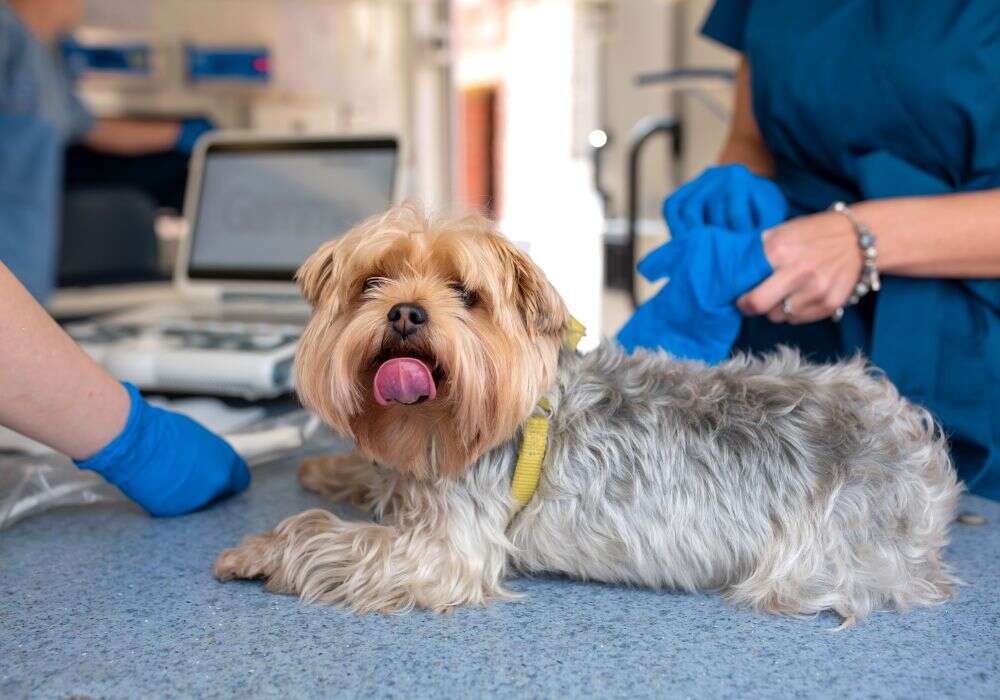Introduction
Spaying is a surgical procedure that removes a female dog’s reproductive organs, typically the ovaries and uterus. It is a common and safe procedure that can offer a number of benefits to your Yorkie, including:
- Preventing unwanted pregnancy
- Reducing the risk of certain types of cancer
- Improving your Yorkie’s overall health and well-being
If you are considering spaying your Yorkie, it is important to talk to your veterinarian about the benefits and risks of the procedure. They can help you make the best decision for your pet.
| Key Takeaways |
|---|
| Spaying your Yorkie is a safe and effective way to prevent unwanted pregnancy. |
| Spaying your Yorkie can also help to reduce the risk of certain health problems, such as uterine cancer and mammary tumors. |
| The spay surgery procedure is relatively simple and typically takes less than an hour. |
| Aftercare for your Yorkie after spay surgery is important to ensure a smooth recovery. |
What is spay surgery?
Spay surgery, also known as ovariohysterectomy, is a surgical procedure that removes a female dog’s ovaries and uterus. It is a common and safe procedure that is performed on thousands of dogs each year.
Benefits of spaying your Yorkie
- Prevents unwanted pregnancy
- Reduces the risk of certain types of cancer, such as mammary cancer
- Can help to improve your Yorkie’s behavior
- May help to extend your Yorkie’s lifespan
Risks of spaying your Yorkie
- Slight risk of anesthesia complications
- Slight risk of infection
- Potentially life-threatening complications are rare
It is important to weigh the benefits and risks of spaying your Yorkie before making a decision. If you have any questions, please consult with your veterinarian.
Why should you spay your Yorkie?
There are many reasons why you should spay your Yorkie, including:
- To prevent unwanted pregnancies. Spaying your Yorkie will prevent her from getting pregnant, which can save you the cost of having to raise a litter of puppies.
- To reduce the risk of certain health problems. Spaying your Yorkie can help to reduce her risk of developing certain health problems, such as uterine infections, breast cancer, and ovarian cancer.
- To improve her behavior. Spaying your Yorkie can help to improve her behavior by reducing her roaming and marking behaviors.
If you are considering spaying your Yorkie, be sure to talk to your veterinarian about the benefits and risks of the procedure. Your veterinarian can help you make the best decision for your pet.
Benefits of spaying your Yorkie
There are many benefits to spaying your Yorkie, including:
- Reduced risk of uterine cancer: Spaying your Yorkie can help to reduce her risk of developing uterine cancer by up to 90%.
- Reduced risk of ovarian cancer: Spaying your Yorkie can also help to reduce her risk of developing ovarian cancer by up to 90%.
- Reduced risk of mammary cancer: Spaying your Yorkie before her first heat can help to reduce her risk of developing mammary cancer by up to 85%.
- Prevents unwanted pregnancies: Spaying your Yorkie will prevent her from becoming pregnant, which can save you the cost of spaying or neutering a litter of puppies.
- Reduces the risk of behavioral problems: Spaying your Yorkie can help to reduce the risk of her developing certain behavioral problems, such as urine marking and aggression.
Spaying your Yorkie is a safe and effective way to improve her health and well-being. If you are considering spaying your Yorkie, be sure to talk to your veterinarian about the benefits and risks of the procedure.
Risks of spaying your Yorkie
There are some risks associated with spaying your Yorkie, but these risks are generally minor and outweighed by the benefits of the procedure.
- Spay surgery is a major surgery, and as with any surgery, there is a risk of infection.
- Spaying can also lead to a condition called pyometra, which is a bacterial infection of the uterus.
- Spaying can also increase the risk of certain types of cancer, such as mammary cancer.
However, it is important to note that the risks of spaying your Yorkie are very small, and the benefits of the procedure far outweigh the risks.
If you are considering spaying your Yorkie, be sure to talk to your veterinarian about the risks and benefits of the procedure.s
When to spay your Yorkie
The best time to spay your Yorkie is between 6 and 9 months of age. This is before she reaches sexual maturity, which is typically around 6 months of age. Spaying your Yorkie before she goes into heat for the first time can help to reduce her risk of developing certain types of cancers, such as mammary cancer.
If you are not sure when to spay your Yorkie, talk to your veterinarian. They can help you make the best decision for your pet.
How to prepare your Yorkie for spay surgery
Before the surgery:
- Make sure your Yorkie is at least 6 months old.
- Have your Yorkie seen by a veterinarian for a pre-operative checkup.
- Give your Yorkie a bath the day before surgery.
- Make sure your Yorkie is fasted for at least 12 hours before surgery.
During the surgery:
- Your Yorkie will be given anesthesia to keep her asleep during surgery.
- The veterinarian will make a small incision in your Yorkie’s abdomen.
- The veterinarian will remove your Yorkie’s uterus and ovaries.
- The veterinarian will close the incision with stitches or staples.
After the surgery:
- Your Yorkie will be taken to a recovery room where she will be monitored for any signs of complications.
- You will be given instructions on how to care for your Yorkie after surgery.
- Your Yorkie will need to stay at home for a few days after surgery to recover.
- Your Yorkie will need to wear an Elizabethan collar to prevent her from licking her incision.
- Your Yorkie will need to take pain medication as prescribed by your veterinarian.
The spay surgery procedure
The spay surgery procedure is relatively simple and typically takes around 30 minutes. Your Yorkie will be given a sedative to help her relax, and then she will be placed under general anesthesia. The veterinarian will make a small incision in your Yorkie’s abdomen and remove her uterus and ovaries. The incision will be closed with stitches or staples, and your Yorkie will be taken to a recovery room to wake up from the anesthesia.
Aftercare
After your Yorkie’s spay surgery, she will need to be taken home and kept quiet for a few days. You will need to provide her with a comfortable place to rest, and you will need to keep an eye on her incision to make sure it is healing properly. Your veterinarian will give you specific instructions on how to care for your Yorkie after her spay surgery.
Recovery time
Most Yorkies make a full recovery from spay surgery within a few weeks. However, it is important to keep in mind that each dog is different, and some may take longer to recover than others. If you have any concerns about your Yorkie’s recovery, be sure to talk to your veterinarian.
Aftercare for your Yorkie after spay surgery
After your Yorkie has been spayed, you will need to take care of her at home. Here are some tips for aftercare:
- Keep her incision clean and dry. You will need to clean the incision twice a day with a mild soap and water. Be careful not to get the incision wet when bathing her.
- Watch for signs of infection. If the incision becomes red, swollen, or oozes pus, you should take her to the veterinarian immediately.
- Give her pain medication as prescribed by your veterinarian. Spaying can be a painful procedure, so it is important to give her pain medication to keep her comfortable.
- Limit her activity. You will need to limit her activity for the first few days after surgery to allow her incision to heal properly.
- Provide her with a comfortable place to rest. She will need a quiet place to rest and recover from surgery.
By following these tips, you can help your Yorkie heal quickly and get back to her normal activities.
Conclusion
Spaying your Yorkie is a responsible decision that contributes to their health and well-being. Understanding the process and care involved in Yorkie spay surgery is crucial. Post-surgery, ensuring your Yorkie’s comfort with soft yorkie pajamas for dogs can aid in recovery. It’s also beneficial to know about Yorkie water safety precautions as limited activity is recommended post-surgery. Additionally, familiarizing yourself with Yorkie feeding guides can help maintain their optimal weight during the recovery period.
Key points to remember:
- Spaying your Yorkie can help to prevent uterine infections, breast cancer, and other health problems.
- Spaying your Yorkie can also help to reduce the number of unwanted puppies in shelters.
- Spaying your Yorkie is a relatively simple procedure that is typically performed under general anesthesia.
- The recovery period for spaying is usually short and your Yorkie should be back to her normal self within a few days.
If you have any questions or concerns about spaying your Yorkie, be sure to talk to your veterinarian. They can help you make the best decision for your pet.

As a lifelong dog lover, I fell in love with Yorkies for their spunky personalities, intelligence, and unwavering loyalty.
As a dedicated Yorkie owner, I have spent years learning about the breed and how to provide the best possible care for them. From finding the proper diet to exercise, and so much more! I take every aspect of my Yorkie’s life seriously.
In addition to being a loving dog parent, I’m an avid blogger, sharing my experiences and insights on all things Yorkie-related. From training tips to grooming advice, Yorkieclothing.com is a go-to resource for other Yorkie owners worldwide.




